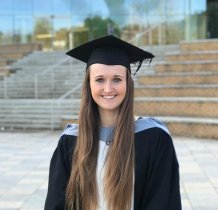
Among those to take the early graduation option is Medicine student Molly Dineen
Medicine students graduate early to help on COVID-19 frontline
Medicine and Medical Imaging students from the University of Exeter Medical School have opted to graduate early so they can qualify as junior doctors and diagnostic radiographers to ease pressure on the NHS in the battle against COVID-19.
More than 50 final year students have opted to graduate early, meaning they will be able to support health trusts months earlier than their planned August start date. As foundation year doctors and radiologists, it is expected that they will free up more experienced colleagues to work on COVID-19 wards in the South West.
Final year Medical Imaging students who have successfully completed all clinical elements of their programme have been offered the opportunity to fast-track the final two months of their academic programme in order to graduate earlier. In order to facilitate early graduation for those who choose it, modifications have been made to students’ remaining assessments and the key standards they have to achieve have been mapped against their attainment in their programme so far. All Medical Imaging students will be put onto the Health and Care Professions Council’s temporary COVID-19 register from this week, which will allow them to practice and support the COVID-19 response.
Among those to take the early graduation option is Medicine student Molly Dineen, 24. She will be working in the Royal Devon & Exeter NHS Foundation Trust. She said: “I took the option to graduate early because I felt I was ready. Naturally it’s a daunting prospect to start earlier than expected but I’m proud that I’ve come out of medical school as a qualified doctor. At Exeter we’re very fortunate to get clinical experience from day one, and I think this is the best use of my skillset to make a valuable contribution in supporting the NHS in the fight against COVID-19.”
Molly, from Winchester in Hampshire, has to cancel her clinical placements in New York and South Africa to return home at the start of the crisis. “Obviously, it’s gutting to rush home from the trip of a lifetime, but everyone has sacrificed so much. I just wanted to get back home and put my skills to use.”
Medicine student James Farquhar, 23, also decided to graduate early, and will be working in Yeovil, Somerset. He said: “I’m actually excited to graduate early. We feel we’re ready. Some people are saying there’s no better time to join the NHS – there’s a real camaraderie and everyone’s pulling together. At Exeter we complete all our formal learning in Year 4 – so by our final year it’s all about clinical exposure. It’s basically a dry run at being a foundation doctor. Most of us are training as doctors because we want to help people and improve health, and for me this is the best way to make a positive impact.”
James, from Cheltenham in Gloucestershire, had to catch an emergency flight back from his clinical placement in South Africa. He said: “It was disappointing, and we’re all a bit gutted to miss graduation and end of year celebrations like our ball, but all that seems pretty insignificant in the grand scheme of things. We just want to help.”
Professor Ian Fussell, Associate Dean of Education at the University of Exeter Medical School, said a virtual graduation was being planned. He said: “We’re so proud of how all of our students have responded to this crisis. Many of them are already volunteering in various ways but some cannot for various reasons and we are equally proud of them. We know our students are well prepared and will make a significant contribution in supporting the NHS.”
Date: 2 April 2020
